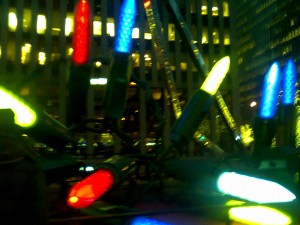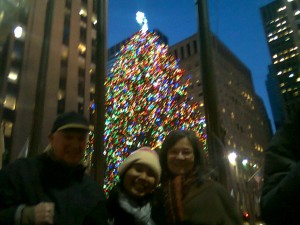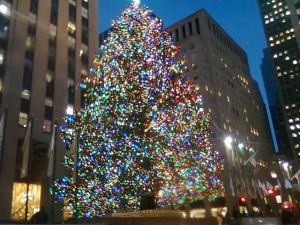Christmas is a big deal in the west, especially in the United States which consumes and imports many Christmas products from China and other countries. It has been repeated time and again that Christmas has been increasingly commercialized over the past decades. And, if that is true, it has certainly become a traditionally commercial festival in the west.
Having stayed in the US since the early December 2010, or for four weeks, I come to a conclusion that Christmas is all about buying this year’s gifts with next year’s savings. I was told by a Cambodian friend who has lived here for over six years that after Christmas, most of the Americans go broke. People I met began to decorate their home with splendid expensive things and purchase gifts for family and friends.
That is apparently true for they, with my observation, had generously bought magnificent gifts for their beloved ones without much thought over money for tomorrow. My Cambodian host I am staying with ran from one store to another to buy his neighbours chocolates and postcards before Christmas day when I noticed many stores such as Wallmart opened a great deal of Christmas products and clearance sales.

Today all the stores closed, and as I toured around the area I am temporarily staying, I got a feeling that this was actually like Khmer New Year that is celebrated in April. It was quiet outside, and every house was lit inside. I imagined, people were chatting with family members and friends merrily.
Some people can argue that Christmas has lost its intrinsic meaning to commercialization and the economy that has to run non-stop. However, Christmas sales can be of best use for the whole country when people buy and sell things if we take an economist’s view into consideration. But from a traditionalist’s view, it is deteriorating society when people place more importance on buying gifts than getting together with friends and family. These views really must be balanced for one’s society to function smoothly.
It was unexpected that a country like Cambodia starts to slowly embrace Christmas. Not just Cambodia, really, but also many countries in the world. Even Buddhists in Cambodia celebrate Christmas. They send their friends text messages of Merry Christmas and some have gone to great length to buy postcards and gifts and go out for dinner. It is questionable that now Christmas is celebrated for fun but not for a religious reason in Cambodia. However, many people in Cambodia whom I had had a conversation in the past with show no sign of religious interest or relation to Christmas.

When Cambodia started to be open to free trades, many people could expect that it would be influenced politically and economically. As for Christmas, it may not necessarily be a religious holiday that Westerners have but can be a fun event for Asians in other parts of the world. Seeking for a better life like a Westerner is a trendy phenomenon for Asians, so it is obvious that Christmas is just one of the economic effects and just as one English word best describes Cambodia’s situation: to keep up with Joneses.
My host family and I ended Christmas day by having a dinner with their former Vietnamese landlady. They agreed on this: when the world laughs, let’s laugh with the world. But when the world cries, why be bothered?

You can also find the article in the Mirror.
2 thoughts on “Traditional Commercialization and Christmas”
Comments are closed.
Enjoy your writing and observation.
Have tried to get in touch with you about the interview on parasitic diseases in Cambodia.Could not get through to your phone.You can email me for more detail.The contact site in your blog will not let me in.Dr Hong
Xmas is no longer and much like a traditional celebration for millions and millions of Christian and or Catholic but it is rather a commercial driven festive season. Another important day on the Christian calendar is Easter, which will be sometime in April, but Easter eggs and bunny are already in stores since mid- January (in Australia).